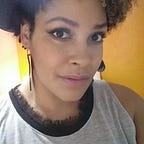Leonard Nimoy’s Letter to All of Us
Growing up biracial, I loved Mr. Spock. Now I understand why.
I remember vividly the first time that I came across Leonard Nimoy’s 1968 letter to a biracial girl who was feeling ostracized by her peers. By the time the letter found its way to the internet in 2013, 45 years after it was originally published, I was already an adult with two kids. But reading that girl’s letter to Spock, and reading Nimoy’s response, immediately transported me back to my own childhood.
Summers at my grandparents’ house were wonderful and horrible. My mother is white and my father was Nigerian, but he went back to Nigeria when I was very young, and so my mother and her family raised me and my little brother. Because my mother had to work and couldn’t afford daycare, we spent most of our summers with our wealthy white grandparents. We would be transported from our own impoverished apartment, which often lacked electricity, to our grandparent’s 4,000-square-foot home. My brother and I felt loved by our grandparents, but also alien — not only to the greater white community that we lived in, but to our own family.
Going outside to play in our grandparent’s upper-middle-class suburban neighborhood, we were always inspected and questioned. Are you adopted? Why is your hair like that? How is that your mom? Why don’t you look like her? I remember being absolutely puzzled and frustrated by these questions. I knew that I wasn’t adopted, but everything else was a mystery to me. I didn’t know why my skin was darker than all of my friends. I didn’t know why my hair didn’t move in the wind. I didn’t know why my lips were bigger. I didn’t know why my mom didn’t look anything like me. But I was pretty sure that whatever the answer was, it wasn’t good.
It wasn’t surprising that I quickly found myself wanting to stay indoors all summer. I would pull my grandmother’s red crocheted blanked over my legs as I sprawled out on their couch in front of their big screen television. I started with Star Wars because my grandma had the boxed set on VHS. When she tired of hearing the Star Wars theme song over and over again, she started introducing me to TV shows she had liked; first M*A*S*H, and then Star Trek. I think she thought I would connect with Uhura; I remember her pointing to the screen and saying, “She looks just like you.” But when I saw Spock I had eyes for no other.
At the age of nine, I didn’t have words to describe why I was so transfixed by Spock. I remember feeling outrage whenever he was rejected. I remember watching Spock struggle with the Vulcan community’s perception that he had been dirtied by his human blood. I remember being positive that I knew exactly how he must have felt. I remember watching the snide remarks his human shipmates made about his Vulcan heritage and yelling at the screen, “You just don’t understand him!” I remember at times wishing I could organize a protest to demand that humans and Vulcans recognize how wonderful and special Spock was. I wanted so desperately for him to be loved and accepted.
I didn’t fully understand at the time that Spock’s isolation echoed my own. But the feelings that I had when the neighbor kids weren’t allowed to play with me were the same I saw in Spock when he faced scorn from his Vulcan peers. When the black kids at my school insisted that I wasn’t “really black,” or that my “white” accent showed that I thought I was better than them, it looked a lot like Spock’s fellow crew-members when they called him “green-blooded.”
There were no other mixed-race kids in my school except for me and my brother until I was in 7th grade. Spock was the only person who understood what I was going through. And through all of the ridicule and rejection, he remained strong, he remained good, he remained proud. He was special; and even if the humans and Vulcans around him couldn’t see it, they also couldn’t destroy it. Maybe I was special too.
I know why that lonely girl wrote that letter to Spock. In a way, all of us misfit kids were writing the same letter every time we tuned in to watch this curious pointy-eared half-human overcome entire galaxies of prejudice. And in a way, like he did in his generous and kind response to that long-ago girl, with every episode Spock was writing back to each and every one of us too.
